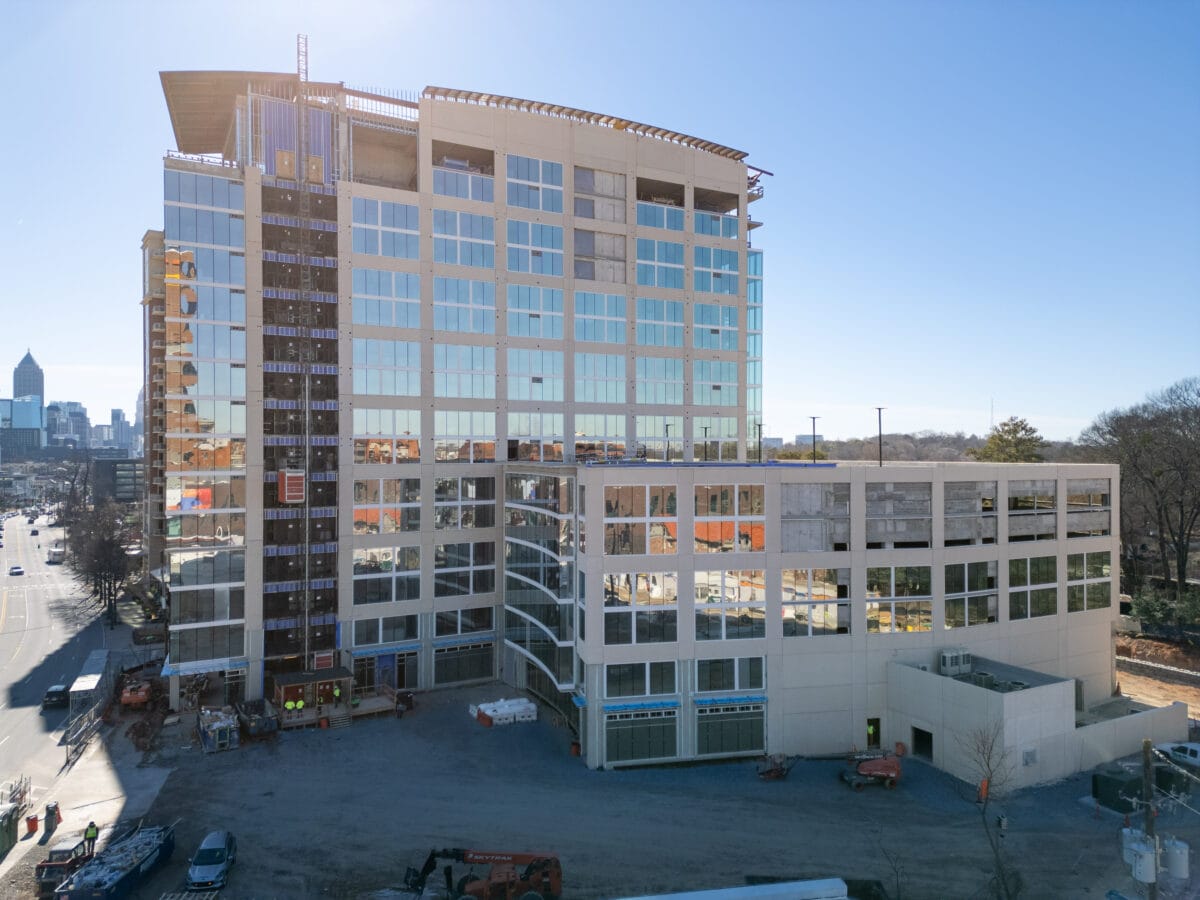
When the Shepherd Center first began operations in 1975, the brain and spinal cord injury rehabilitation organization had just six beds, all of which were leased. The nonprofit’s budget for 1977 was a mere $126,000.
Over 40 years later, the Shepherd Center has become a leading neuro-rehabilitation hospital that helps restore the lives of patients with spinal cord injury, brain injury, stroke, multiple sclerosis, spine and chronic pain, and other neuromuscular conditions stemming from a life-altering injury or diagnosis. After leading the rehabilitation of over 10,000 patients, the Shepherd Center is extending its care with its most ambitious project yet. The construction of two additional facilities and renovations are part of a massive $360 million expansion/improvement project, made possible in large part by donations from Home Depot co-founders Arthur M. Blank and Bernie Marcus.
Construction on the two additions, which will significantly expand the housing and care facilities of the Center, is underway near the organization’s main campus along Peachtree Road.
“It’s the largest campaign we’ve ever done,” said Jamie Shepherd, COO of the Shepherd Center who will serve as CEO later this year. “And it exceeded expectations. We are excited to be able to serve more patients. Not a lot of [facilities] have the specialty and ability to help those we work with, so the expansion is fantastic.”
Recently, a “topping out” ceremony was held for the 16-story Arthur M. Blank Family Residences facility one block south of the Shepherd Center’s main campus. Funded by a $50 million capital grant by the co-founder of Home Depot and owner of the Atlanta Falcons, the facility will double the center’s housing capacity with 160 new units. The residences will allow more families to stay at the Shepherd Center while their loved one completes rehabilitation.
Shepherd said the residences will allow families to stay for the entire duration of treatment, which averages about 50 days. Currently, families living outside of 60 miles from the Center are limited to 30 days of stay due to demand.
“There’s no question that the level of care patients receive here is remarkable, but they also need the love, care, and nourishment of their families,” Arthur Blank said in a statement. “Our family foundation is honored to support Shepherd Center in helping more families heal together. We hope that having a safe, accessible place to call home here in Atlanta while they are away from their own homes will help lift the incredible burden of these types of trauma in some small way so that families and patients can focus on their healing and each other at a time when that is the most important and most needed.”
The residency tower is expected to be completed in September, Shepherd said. It could open as soon as October.
Meanwhile, the Marcus Center for Advanced Rehabilitation next door to the main Shepherd Center building is expected to open in early 2025.
The facility, funded by an $80 million grant from longtime supporter The Marcus Foundation, includes the creation of a new 30,000-square-foot Innovation Institute, and allows the Shepherd Center to expand its day programs and outpatient services. Home Depot co-founder Bernie Marcus and his wife Billi have been supporting the Shepherd Center through the Marcus Foundation and personal donations since the 1980s.
Concurrently, the Shepherd Center is enhancing its main campus by expanding its capacity, modernizing patient rooms and expanding the Andrew C. Carlos Multiple Sclerosis Institute.
In late 2022, Gas South, through the Buckhead Coalition, made a $310,000 donation to benefit the Shepherd Center’s rehabilitation program for teens.
The expansion is also personally gratifying for Shepherd. His father, James, suffered a spinal cord injury in 1973 that left him paralyzed from the neck down. Despite a myriad of complications, James Shepherd survived the incident, aided by the Atlanta native completing months of rehabilitation at a Denver, Colorado, facility specializing in the treatment of patients with spinal cord injuries. There simply wasn’t such an option in the Atlanta area.
James Shepherd, along with his parents, then set out to create a rehabilitation center in the southeast. Since its modest beginnings, the Shepherd Center’s services and influence has continued to grow.
“My father had nowhere in this half of the country to go,” Shepherd said. “To have [the Shepherd Center] in the southeast, it’s a crown jewel. Half of our patients come from Georgia, but half come from all around the country. They are coming here because they want to and because we are excellent at what we do. My father’s drive and determination to live, give back and further his legacy makes [the expansion] exceptionally meaningful.”
“Donor support is really important for all we do,” Shepherd said. “We have 20 programs all patients have access to that are not reimbursed from insurance. We raise $12-15 million each year for these programs because it’s best for the patients and their outcomes. And with our expansion, that’s $360 million in building costs. We’re a nonprofit, so we are not able to take up that debt. Donors make the renovations possible. We’re thankful to the Buckhead community for their support, and the support of the state and surrounding states. We wouldn’t be able to do these projects without support.”